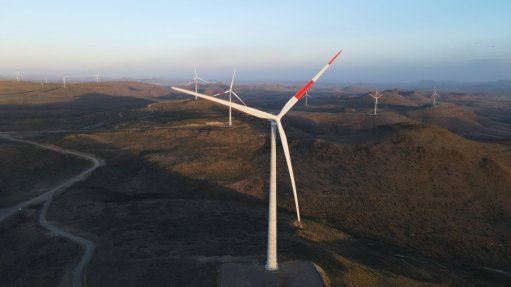Rhodes University progresses plan for a secure water future amid municipal decline
Amid faltering water security, the result of municipal decline, Makhanda-based Rhodes University, in the Eastern Cape, is making significant progress in its efforts to reduce reliance on municipal water supply and ensure long-term water security on its campus.
As sustained water challenges at times threaten the academic project and the sustainability of the university, the university’s Institute for Water Research (IWR) has been investigating alternative water sources and infrastructure improvements to create a sustainable and resilient water system.
“This mission-critical project is an opportunity to give back to the university because we are invested in Rhodes University’s long-term water security and continued success. It was also an opportunity to apply our research at home and to collaborate across disciplines to deliver value,” said IWR head of hydrology Dr Jane Tanner.
Rhodes University has been developing its interdisciplinary water security plan through scientific, engineering and people-centric processes to assess the potential for harnessing a supplemental water supply for the university.
The engineering and policy steps are now underway following the completion of the scientific assessment of the project's feasibility.
The specialist research undertaken to date focused on three potential supplemental water sources: rainwater harvesting, greywater reuse and groundwater supplementation.
Rainwater collection from rooftops was evaluated, and while the findings suggest it is not a viable standalone solution owing to Makhanda’s unpredictable rainfall patterns, it may be useful for ablution.
Treated greywater from showers and basins has been identified as a cost-effective solution for irrigation and ablution, the optimum reuse of which requires infrastructure upgrades, semi-centralised treatment systems and dual plumbing, which have been identified as priorities.
Groundwater supplementation was another potential supplemental water resource for the educational facility, with the research identifying the Witteberg Quartzite aquifer, which stores groundwater beneath the university and is replenished by rainwater, as the most suitable for supplying the university.
“The university sits on top of a very good water aquifer with potential for supporting the university in the environment, with little adverse impact on the surrounding community,” said Tanner.
A groundwater model showed that existing boreholes could be part of the demand, with additional boreholes needed for a full campus solution. Water treatment is part of the plan to ensure safety and compliance with drinking water standards.
“Analysing the different supplemental supply options for Rhodes University is not a simple undertaking. For all of these options, we did very detailed analysis,” she said, noting that groundwater supplementation showed great promise for supporting Rhodes University’s longer-term water security.
Implementation will be undertaken through two phases.
The first phase focuses on the upper campus, which already has an independent water distribution system owned by the university. This phase will incorporate groundwater extraction and treatment, addressing around one-third of the university’s water needs.
Phase two will see the implementation of the water plan across the rest of the campus and introduce greywater reuse where feasible.
“This phase will be more complex as the lower campus is integrated into the municipal supply, requiring new infrastructure,” Tanner commented.
Rhodes University has started securing a water use licence from the Department of Water and Sanitation for groundwater use, which requires regulatory approval, stakeholder engagement and environmental-impact assessments.
Simultaneously, a feasibility study is being prepared to finalise the technical details and costs of implementation.
“This will include identifying precise borehole locations through geophysical surveys; upgrading the campus water distribution network; designing new reservoirs for raw and treated groundwater storage; developing a modular water treatment plant; and setting up a comprehensive monitoring system for water quality and use.
"By integrating groundwater use with efficient infrastructure and water-saving measures, Rhodes University is taking proactive steps to ensure a reliable water supply for students, staff and research facilities.
“While challenges remain, the progress made so far marks an important step towards a water-secure future for Rhodes University,” Tanner concluded.
Article Enquiry
Email Article
Save Article
Feedback
To advertise email advertising@creamermedia.co.za or click here
Press Office
Announcements
What's On
Subscribe to improve your user experience...
Option 1 (equivalent of R125 a month):
Receive a weekly copy of Creamer Media's Engineering News & Mining Weekly magazine
(print copy for those in South Africa and e-magazine for those outside of South Africa)
Receive daily email newsletters
Access to full search results
Access archive of magazine back copies
Access to Projects in Progress
Access to ONE Research Report of your choice in PDF format
Option 2 (equivalent of R375 a month):
All benefits from Option 1
PLUS
Access to Creamer Media's Research Channel Africa for ALL Research Reports, in PDF format, on various industrial and mining sectors
including Electricity; Water; Energy Transition; Hydrogen; Roads, Rail and Ports; Coal; Gold; Platinum; Battery Metals; etc.
Already a subscriber?
Forgotten your password?
Receive weekly copy of Creamer Media's Engineering News & Mining Weekly magazine (print copy for those in South Africa and e-magazine for those outside of South Africa)
➕
Recieve daily email newsletters
➕
Access to full search results
➕
Access archive of magazine back copies
➕
Access to Projects in Progress
➕
Access to ONE Research Report of your choice in PDF format
RESEARCH CHANNEL AFRICA
R4500 (equivalent of R375 a month)
SUBSCRIBEAll benefits from Option 1
➕
Access to Creamer Media's Research Channel Africa for ALL Research Reports on various industrial and mining sectors, in PDF format, including on:
Electricity
➕
Water
➕
Energy Transition
➕
Hydrogen
➕
Roads, Rail and Ports
➕
Coal
➕
Gold
➕
Platinum
➕
Battery Metals
➕
etc.
Receive all benefits from Option 1 or Option 2 delivered to numerous people at your company
➕
Multiple User names and Passwords for simultaneous log-ins
➕
Intranet integration access to all in your organisation


















